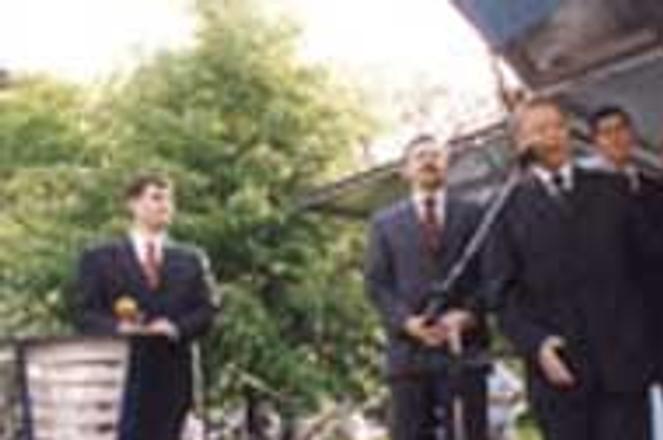The last rally of the campaign featured a hopeful Rudolf Schuster at the microphone.photo: Vladimír Hák-Profit
On the last day of the presidential campaign, Rudolf Schuster, Chairman of the Party of Civic Reconciliation (SOP and the presidential candidate of the ruling joint coalition, held a rally hosted by the chairmen of the governments four ruling parties in Bratislava's SNP square.
The fired-up group of some 1,000 supporters - and protesters - gathered around a small stage to encourage or heckle the man with the celebrated communist past who currently heads all major polling services ahead of his closest rival, HZDS chairman Vladimír Mečiar. On stage, the smiling Schuster was flanked by Prime Minister and SDK head MikulŠö Dzurinda, Parliamentary Speaker and SDL chairman Jozef Migaš, and the boss of the ethnic Hungarian party, Bela Bugar.
The politicos appealed to the crowd to vote for Schuster in order to secure victory over the controversial Mečiar,who they said would drag Slovakia back to a time of corruption and disrespect for the law which ran unchecked during his tenure in office.
While a majority of the attendents responded in favour of both Schuster's and Dzurinda's emphatic appeals, a few amongst the throngs booed Schuster and showered him with words like "filthy communist!" and "Comrade!".
The May 12 rally was one of the few large election-related events to take place in the city capital during the short, two-week campaigning period. But the low-key handshaking of candidates which dominated the campaign scene around the country was offset by a number of dramatic political events.
Foremost among these was the decision of former president Michal Kováč to give up his presidential aspirations May 12 [see accompanying story]. Immediately after Kováč announced the withdrawal of his candidacy, he appealed to Slovak citizens to vote for a pro-coalition candidate in order to prevent the return of 'Mečiarism' to Slovakia. In what initially seemed like a premature response, Schuster - the candidate endorsed by the coalition - thanked Kováč for the former president's support.
Kováč then raised some eyebrows by offering a vague interpretation of his withdrawal. According to the daily newspaper Sme, Kováč said that his decision had not meant support for any specific candidate, including Schuster. "I meant a coalition candidate who would be a guarantor of support for democratic change [after September national elections]," Kováč told the daily.
But Kováč then told the private TV Markíza, "I meant the person who had the biggest chance to achieve victory over Vladimír Mečiar, and that is Mr. Schuster."
Meanwhile, former actress and ambassador to Austria Magda Vášáryová continued her candidacy drive and remained firmly entrenched in the third slot in all major polls. During her campaign, the leading civic candidate faced a challenge from Brigita Schmognerová - arguably the most powerful woman in Slovak politics - on May 12 when the Finance Minister called for Vášáryová to withdraw her candidacy and pledge her support to Schuster. In response, the presidential hopeful called the request "irresponsible", and reiterated that she would not drop out of the race.
Branislav Orgoník, Vášáryová's campaign manager, said that, his candidate was far from quitting and added that she had actually run the most successful campaign staged by a non-party candidate. He told The Slovak Spectator that this fact was "apparent from the extremely positive and enthusiastic reactions we received in all the numbers of places we visited and the all the people we met."
Orgoník added, however, that the general feeling amongst voters since the entrance of Mečiar could result in a negative outcome for his candidate. "Unfortunately, these outer elements play a big role," he said, "because many Slovaks still live in fear of [a return of] Mečiarism and they will try to do anything to prevent it - even vote for a candidate they, under other circumstances, wouldn't vote for."
An 18-year old student from Dunajská Streda at the Schuster rally agreed with Orgoník. Hanging on the arm of his girlfriend, he said that the Schuster rally at Bratislava's SNP square was the only campaign event he had attended because, "the only option left is to vote for Schuster, mainly because of Mečiar's candidacy."
Adding further intrigue to the elections were the outbursts of far-right politician Ján Slota, making Slovakia's abbreviated first ever direct presidential election campaigns interesting, if nothing else. On STV's special pre-election program entitled 'Presidential Elections of the Slovak Republic", the nationalist SNS party chairman offered up a rousing array of outbursts. While discusssing the rules of the show, for example, Slota quipped, "I'd like to kick the directors of STV beyond Mars!"
Slota also announced at a May 10 press conference that he had come into possession of certain documents which allegedly prove that southern Slovak towns with high minority populations of Hungarians would become part of a "Greater Hungary" conspiracy by the year 2005.
The thirteen-day pre-election presidential race ended on May 12, two days before people went to the polls. Although the campaign was allotted only 13 days, some analysts said its short length didn't skew the election results because many voters had already decided for whom they would vote before the campaign began.
In regards to the few undecided voters, some analysts said that the campaign had likely swayed them closer to their final voting decision. "The campaign turned out to be very successful, especially for the relatively unknown candidates," said Alexander Duleba, analyst with the independent think tank Slovak Foreign Policy Association. "Many voters who were not yet decided who to vote for made up their minds."
Author: Ivan Remias


